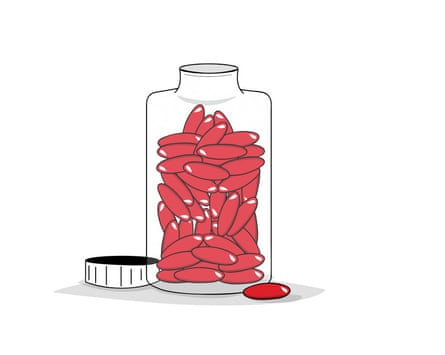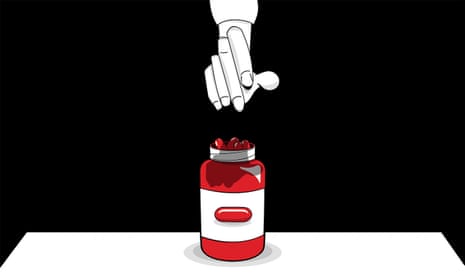How shitty are men really? The question hung in the air, invisible but omnipresent, like the smell of a garbage fire from a nearby town. By 2016, a series of catchphrases had come to dominate the chaotic state of gender politics – “male privilege”, “rape culture”, “men’s rights” – but confusion reigned. And in the middle of this confusion, a group of anonymous men retreated to The Red Pill, an online community hosted on Reddit, to revel in their loathing.
The name derives from a scene in the 1999 film The Matrix, in which Laurence Fishburne offers Keanu Reeves a choice: “You take the blue pill – the story ends, you wake up in your bed and believe whatever you want to believe. You take the red pill – you stay in Wonderland and I show you how deep the rabbit hole goes.”
The rabbit hole, in this case, is the “reality” that women run the world without taking responsibility for it, and that their male victims are not permitted to complain. This makes The Red Pill a continuous, multi-voiced, up-to-the-minute male complaint nestled at the heart of the so-called manosphere – a network of websites preoccupied with both the men’s rights movement and how to pick up women.
The manosphere’s most hateful opinions tend to generate the most attention – like Roosh V’s notion that it should be legal to rape a woman on private property (a bit of hateful stupidity which he later claimed to be parody). In February, Roosh V attempted to organise a meet-up of like-minded men on the grounds of the provincial legislature in Toronto, but he had to cancel the event when a local band of female boxers threatened to disrupt the event with violence.

But judging The Red Pill by the most extreme statements of its members is, if not unfair, then at least inaccurate. There is plenty of vileness, to be sure – elaborate conspiracy theories formed out of pure misogyny and outright hatred of female independence. But the bulk of the comments are much more muted and, frankly, pathetic.
In the hours upon hours I spent wandering this online neighbourhood, I saw mostly feral boys wandering the digital ruins of exploded masculinity, howling their misery, concocting vast nonsense about women, and craving the tiniest crumb of self-confidence and fellow-feeling. The discussion threads are a mixed bag of rage and curiosity: screeds against feminists, advice on how to masturbate less, theories on why women fantasize about rape, descriptions of arguments with girlfriends, guides to going up to strangers on the street, and, most of all, workout schedules and diet regimes.
Reading The Red Pill, then, offers two possible answers to the question “how shitty are men really?”
The first situates The Red Pill as another toxic technoculture on a spectrum of digital misogyny: on Twitter, any woman who says anything even moderately controversial will receive torrents of direct physical threats as a matter of course. Sites such as 4chan exist mainly to post thousands of revenge porn images without consent. Gamers on Xbox Live will be sexually harassed, inevitably.
The answer to the question of how shitty men are, from this perspective, is “really pretty shitty”.
But an entirely different approach emerges with a slight shift in emphasis: how shitty are men really? That is, how does these men’s behaviour online translate into non-digital life ? The Red Pill poses one of the absolute conundrums of our time: are we our real selves on the internet, or are we not?
The head moderator of The Red Pill goes by the handle Morpheus Manfred, and when he agreed to give me an interview it was only by online chat. Anonymity is sacred; facelessness is the sacrifice it demands. He moderates the community’s 141,966 (and counting) members, and like most of them, describes himself as white, early 30s, male and conservative (he would have preferred Rand Paul to Donald Trump, but he likes Trump’s “watch-it-burn” style).
This article includes content hosted on s3.amazonaws.com. We ask for your permission before anything is loaded, as the provider may be using cookies and other technologies. To view this content, click 'Allow and continue'.
I ask him what event led him to The Red Pill (his answers have been edited for length).
Morpheus Manfred: Having spent my 20s looking for female companionship, I noticed that the dating game wasn’t what I was taught – what my parents prepared me for, and what I learned from movies. It was stacked against guys, and it was a very unpleasant experience.
Me: Can you give me an example?
Morpheus Manfred: Over the past 10 years, the flakiness of women has gotten worse. You’d meet a girl, hit it off, get her number and agree to a date. And either she’d no-show, or cancel right before. I found myself putting in all this effort for nothing, it was very defeating. It’s not the way courting worked when my parents met.
What I saw in movies – where having a good heart and being yourself is all you need – that’s not what happens now. Good and nice aren’t attractive any more. The manosphere fundamentally became a surrogate father for the life lessons I never got.
We wanted a place where men could discuss masculine topics without facing the same public shaming outcry that happens on social media sites – feminists are quick on the trigger to try to take down anything they consider wrong … Milo Yiannopoulos lost his verified status on Twitter because of his views on masculinity. It’s a big topic that has become taboo in our culture.
Me: But surely there’s a line somewhere. I mean, the real feelings being expressed here are hostility to women.
Morpheus Manfred: We’re accused of misogyny almost daily. I won’t deny that the language is colorful and there’s a lot of emotion expressed by the men on the forum. But [before The Red Pill] there wasn’t really a way for guys to express these feelings.
Let’s say there’s a guy who just says “I hate women” – I think that’s textbook misogyny. We let them say that. Because there’s nowhere else for a man to blow off steam. But they stay, they learn, they vent, they get advice, they get back on the horse. The endgame of our advice isn’t to hate women. It’s to understand them so you can stop being so darn frustrated by them.
Morpheus claims that The Red Pill helped him find a longtime girlfriend, and that The Red Pill is ultimately little more than an online version of locker-room talk.
It’s funny, because Jessica, my editor at the Guardian, had the same idea. Wasn’t The Red Pill just an updated version of locker-room talk? No, I said, it’s nothing like locker-room talk. Well, she asked, what’s locker-room talk like, then?
Locker-room talk goes like this: you say to your friend, my God, did you see the tits on that yoga instructor, and your friend says, it hurts you, doesn’t it, and you say it does, it does, and he says you know I’ve sucked tits like that before, and you say yeah right and he says really and you say who and he says in Brazil and you say of course it would be an unverifiable claim, and he shrugs and you laugh and he laughs.
The quantity of locker-room talk is inversely proportional to familiarity with women. So, as you fall in love, maybe even get married, it no longer becomes feasible to talk with friends about women’s bodies in such specific detail because, say, your friend works for your wife, and you don’t want him thinking about her cleavage when she’s firing him.

But very quickly – mid-30s, really – a new locker-room talk emerges. The new locker-room talk goes like this: you ask your friend what summer programming do you have your daughters in, and your friend says I’m trying to find something with science in it, and you say, yeah, you gotta fight those cultural assumptions about girls and STEM, and he says totally, and you say I’m just trying to do little things like nature walks and trips to the science center, and he says we should go together some time, and you say totally.
And then you’re taking your daughters to the science center and a gorgeous woman walks by, and you look at your friend, and your friend looks at you, and you don’t have to say a thing.
I’m not saying this is the way it should be. Frankly, it’s humiliating for everybody involved. But there is a truth there: if you have a working dick and a working soul, you’d better get used to living with contradictions.
It is exactly this capacity for contradiction that the boys of The Red Pill lack so utterly. Their humourlessness is impressive, given that they mostly post comments about the minutiae of sexual dynamics, which is the substance of almost all comedy.
Under “I fucked up. How to fix?” Red Pill member AspireToBeGreater requested some advice from the group. He had met a girl. She was all smiley during their initial conversation. But then “I horribly botched an attempt to ask her out for drinks because I got nervous. I pulled back and tried to rebuild my frame over a couple weeks.” She was still giving off signs of interest, notably showing him pictures of her dogs. “I have since asked her to get coffee in a much more casual way, she had a legit excuse and I couldn’t read much from her response.” Should he keep pushing?
The replies came to a rapid consensus. A commenter noted: “She’s turned you down twice, which means she’s almost certainly not interested.” Another added: “Most likely she’s just not that into you if she doesn’t even suggest an alternative date.”
The above is a fairly typical post. The Red Pill grinds away at the confusions of contemporary masculinity, both real and imagined. The intellectual foundation of The Red Pill is its glossary – a shared language of complaint and insight. So we have, for example:
Alpha – Socially dominant. Somebody who displays high value, or traits that are sexually attractive to women.
SMV – Sexual Market Value. A shorthand statement for “what you bring to the table”, whether for a one-night stand or for a longer relationship.
HB – Hot Babe (often followed by a ranking on a 1-10 scale).
AF/BB - Alpha Fucks/Beta Bucks. AF/BB, as an idea, is closely related to AWALT (“All Women Are Like That”). All women, in this argument, divide men into two types: alpha males they want to fuck, and beta males they use for financial and emotional support in exchange for sex.
Definitions like these run into the dozens. Their primary purpose is clarity, obviously. More than lust or hatred, the boys of The Red Pill hunger for clarity. They desire escape from confusion. They desire a system with which to comprehend desire itself.
Don’t we all?
In real life, I knew a man once who was the exact opposite of The Red Pill in every regard, and he shattered everything that I believed I knew about men.
Never did he say the least inappropriate thing, at least around me. No locker room talk for him. He had graduated from York University, the most politically correct university in Canada, with a minor in women’s studies. He proudly called himself a feminist, and he was called a feminist proudly by others. In his job as the most prominent radio host at the CBC, the national broadcaster, he had become an icon of the new multicultural and egalitarian Toronto.
That man was Jian Ghomeshi, who was on 25 March acquitted in three cases of sexual assault and choking after the testimony of the complainants collapsed.
Before Ghomeshi, I thought I knew more or less how men worked. I thought – it’s embarrassing to say – I thought I was a close observer of people.
I liked Jian; I cannot deny it. We weren’t close – we met during the time in life when you don’t form new friendships so much as respectful allegiances – but he was fun, pleasant.
And yet I remember a lovely spring wedding in Toronto where the guests, mostly media people, sat around bitching and gossiping as media people do. I made some flip remark about Jian dyeing his hair. Then I saw The Face pass over one of the young women at my table.
I would see The Face several times with several different women when the subject of Jian came up – a half-suppressed deflation, a furtive darkening. The other women told me nothing; The Face simply came and went. But at this wedding, the young woman with The Face did not let her suffering fade into the general background; she leaned in and told me the story of how he had said to her “I just want to hate-fuck you to wake you up” while at work.
I certainly remained friendly with Jian after I heard this story. Why? I have no good answer. The best answer I have is that I have been trained not to judge people on the basis of their sexual tastes. That’s my inclination but it’s also been my education. I refrained from judging him, half-consciously.
Throughout Ghomeshi’s trial, as his lawyer Marie Heinen ripped apart the accusers, I found myself recalling a line from Philip Roth’s The Human Stain, set during the halcyon years when America’s biggest problem was the president’s joint taste for cigars and interns.
“I myself dreamed of a mammoth banner,” Roth wrote, “draped dadaistically like a Christo wrapping from one end of the White House to the other and bearing the legend A HUMAN BEING LIVES HERE.”
That phrase should have been draped over the Toronto courtroom. The accusers responded like human beings, so they forgot to tell things to the police. They forgot their Hotmail passwords. They communicated with each other and with Jian. One of them wrote: “You have beautiful hands.” They responded in a way consistent with the inconsistency of human sexuality, caught in the mess of desire and its justification.
Much has been written about how the Ghomeshi trial has revealed various aspects of our culture and society – the failures of the criminal justice system, or the reality of rape culture, or the impotence of fourth-wave feminism. The Ghomeshi trial has revealed nothing. It has only obscured.
“Rape culture” is a nebulous term, but it remains that men who want to treat women as if they are nothing have ample scope to express that desire – online and offline both. Culture, insofar as it is popular, poses the same question over and over: how cool does a guy have to be before he can treat women like they’re nothing?
When Kesha tried to escape her contract with Doctor Luke, the producer whom she claims raped her, the judge gave the ruling which applies to the music industry as a whole in 2016: “My instinct is to do the commercially reasonable thing.”
Kanye West was able proclaim Bill Cosby’s innocence and release The Life of Pablo with the line “I feel like me and Taylor might still have sex / I made that bitch famous.” And it didn’t matter; Kanye was way too cool. It was performance. Or it was subversion. It was something, anyway, that made it totally different than some ordinary guy saying that Taylor Swift was a bitch he made famous and so could have sex with her. A critic for the New Yorker described the Swift line as “a throwaway boast on an otherwise good song”.

The Weeknd is cool enough to treat women like nothing, too, at least for now. Sure, he has videos in which he shoots his girlfriend, and yes, his song Initiation is a hymn to using the promise of social acceptance to gangbang vulnerable young women. But the man is friends with Drake. He won two Grammys, and the same people in Toronto who loathed Ghomeshi cheered on the victory.
Not that this was in any way a new arrangement, the deal by which cool men treat women like they’re nothing. The Rolling Stones? Led Zeppelin and the mudshark?
David Bowie faced rape allegations in the 1980s, but we’ve all forgotten about that. One of his fans, Lori Maddox, has claimed in interviews that she lost her virginity to him after he gave her champagne and hash when she was about to turn 15. But before we ask ourselves what ought to happen to a grown man in a position of power who gave an underage girl drugs and alcohol and then took her virginity, we should just remember that he dressed really neat and wore makeup and stuff. Bowie was Ghomeshi’s idol, the man he most wanted to interview.
A few years before Morpheus Manfred started up The Red Pill, Ghomeshi blurbed the Guy’s Guide to Feminism. He wrote:
“An admirably accessible guide for guys to understand and embrace the other (often more incendiary) F-word. And it’s even funny. Quite remarkable. Everyone knows feminists have no sense of humour!”
Jian appeared on the back of the book alongside Gloria Steinem and the editor of the online feminist site Feministing.
Where are Morpheus and Ghomeshi now? Morpheus is in a long-term relationship, and developing a sense of humour about himself and his project. Ghomeshi is currently awaiting his second trial. Who is really shitty here?
Again to return to the our conundrum: are we our real selves online or off? Is the screen the place where we indulge the fantasies that our offline selves would never dare? Or is the screen where we perform the truth of our being that that world of faces and consequences does not permit?
Among men today, there is violence hidden under the virtue, and virtue hidden under the violence.
The only constant is the hiding.
In The Red Pill’s glossary, you can find those two entries:
Oneitis – When a guy has fallen in love with a woman in the same way a boy loves his mother. He obsesses about her, but she does not reciprocate.
The Unicorn – Mystical creature that doesn’t fucking exist, aka The Girl of Your Dreams.
If you dig through the misogyny and the bravado, the boys of The Red Pill want The One. They are as lost in that pursuit as every generation of men has been before them.

The Red Pill is hatred of women in the context of men who want nothing more than to please women, and who are living in a world with a sexual marketplace they find deeply anxiety-provoking. Briffaut’s Law, another of the key concepts of The Red Pill, encapsulates male powerlessness as an eternal truth: “The female, not the male, determines all the conditions of the animal family. Where the female can derive no benefit from association with the male, no such association takes place.”
But Redpillers are responding to a much more novel and contemporary reality that such biological imperatives: they are responding to women having financial and sexual power over their own lives and bodies. And they haven’t dealt with it yet. The term “manosphere” is really a misnomer. “Not-quite-a-manosphere” would be better.
What the boys of The Red Pill need, in all honesty, is a massive dose of Romantic poetry. They need a dedicated course of treatment in the novels of Jane Austen and Dostoevsky, combined with significant therapy in negative capability.
They need to learn that love is awful, in the both the ancient and modern senses of the world – that love is infinitely more powerful and real than any marketplace, sexual or otherwise.
They need to read Freud, who wrote that every man wants to murder his father and sleep with his mother and that the only way to be civilized is to recognize that everyone is barbaric way down deep inside.
They need to know that desire is a mess, and that everyone suffers from its mess.
Instead of culture, the world offers the boys of The Red Pill contempt. Instead of education, outrage.
But it’s not just the boys of The Red Pill who need to begin again to learn from the fiasco that is men and women. It’s everybody. It’s the whole world.








